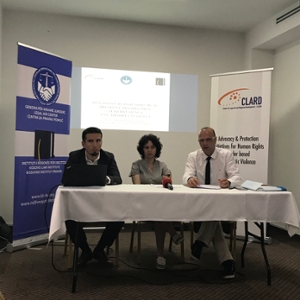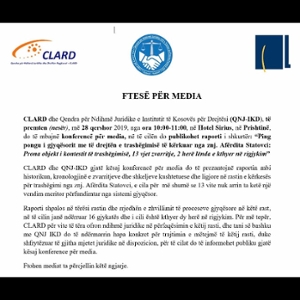Week 6: Press Conferences and History Lessons
This week at work was far less busy than the past few weeks! We are experiencing a bit of a heat wave, and I think that is contributing to the slowdown. My coworker also tells me that the NGO "busy season" is coming to a close at the end of this month; many people in Pristina spend the hottest summer months at their family homes in the countryside (or drive to visit the Albanian coast), so work can slow down a bit until September. Many Kosovars have family working abroad who will typically come home for a visit during July and August as well! Since I will likely not have as many meetings and conferences to attend in the coming weeks, I will be able to focus more on my research on the legal aid system, domestic violence, and property rights here in Kosovo.
The main portion of my agenda this week at CLARD was dedicated to a press conference on Friday about the property case I wrote about in my earlier blog post. On Monday, I accompanied my boss to a meeting at the Kosovo Law Institute (KLI) in downtown Pristina, where we met with representatives of the KLI, the Kosovo Bar Association, the Legal Aid Institute, and the media to discuss the future of this seemingly dead-end case. This case has transformed from a family ownership dispute to a representation of the failures and corruptibility of the Kosovo legal system. It has spent more than ten years bouncing around the justice system, and has now sadly exhausted all legal remedies. After more than a decade, the appeals court has chosen to defer to the lower court decision against the sole (and rightful) heir, instead granting ownership of the land to a family member. CLARD, the Kosovo Bar Association, and the KLI believe firmly that the decision of the lower court violates the law and was a result of corrupt actions. This is a particularly egregious instance of corruption, but the organizations believe that this is not an isolated incident and hope to use this as a catalyst for reform.
CLARD, KLI, and the Kosovo Bar Association held a press conference later in the week that was broadcasted on local news outlets in Kosovo. In making this a public issue, it will hopefully pressure politicians and others in decision-making roles to make a change. Unfortunately, there is not much more to do at this point other than wait.
The press conference (and its flyer):


During some of our downtime this week, I got the chance to ask my boss some in depth questions about the history of the Kosovar legal system. My boss is an excellent source of modern and historical legal knowledge, and thinks it is important for someone studying the legal system here to have a good historical understanding of this complicated region (for which I am very grateful). I learned this week specifically about the Kanun, which was the codification of a set of traditional Albanian laws from a very long time ago. It is no longer technically involved in the modern justice system of Albania or Kosovo, but still plays a large role in social norms and in lawmaking. My boss tells me that sometimes when he reads a court decision, he sees the judge thinking about the Kanun in between the laws. This is problematic for a number of legal reasons, but Kanun law still plays a large role in society (particularly in less-developed areas of Albania and Kosovo) and is a foundation of society, which means it's hard to get rid of completely. From what I have gathered, there are many positive aspects of these ancient laws, like protecting an enemy as long as they are under your roof, that translate into beneficial aspects of daily life like the incredible Kosovar hospitality.
However, the Kanun has some not-so-good elements; one of the more problematic aspects are blood feuds. This is the idea that if someone kills a member of your family, their family owes yours a life (usually meaning that you would kill a member of theirs). Sometimes there were mediation options available, but more often than not these ended in a cycle of revenge and murder. As archaic as this sounded to me, my boss tells me that while not entirely common, there are still families that adhere to the strict code of conduct in the Kanun (like blood feuds) and forego the modern legal system. According to my boss, there have been cases where a murderer goes through the legal system, serves time, and upon their release they (and their family) are still locked into the blood feud. These feuds can span generations, and in keeping with their name, are usually only resolved with blood. I plan to do more research in the coming weeks, particularly how aspects of the Kanun erode at the modern Kosovar and Albanian legal systems.
This week was so very warm, so for fun I took cover in the nearby Albi Mall, which is a huge expanse of shopping and dining, with a bowling alley and a movie theater! The food court was bigger than most American malls I've been in, and by far the most crowded stands were Burger King and KFC!
Until next week!